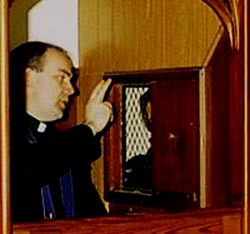In the Luther movie (2003 version) the wise and faithful voice of von Staupitz is heard to say to the tormented Brother Martin: "... you have never confessed anything remotely interesting..." It was a remark intended to diminish the unrest of a broken soul seeking to repent but finding no peace in his repentance. It always draws a laugh from me. Funny because most folks today fear private confession precisely because they think their sins are going to be found too interesting by the father confessor. We have lived with our sins long enough either to make us comfortable in them or to make us so uncomfortable we know not where to turn. Luther was the latter.
We are often afraid our sins are too scandalous to be said out loud. What would the Pastor think?! The ironic reality is that most of our sins are fairly pedestrian. That does not mean they are of little consequence; it simply means that they are ordinary. The truth is the big sins may not be our biggest problems. Those uninteresting and routine sins may be even more dangerous than the more scandalous kind.
As one who has made many confessions and one who has heard many, I can assure you that most of us confess sins more of the mundane variety than the "interesting" variety. We not confess only the extra-ordinary sins in private confession; we mainly confess the routine kind. The dull sins are just as damning as the more salacious kind. That is precisely why private confession is so important. It calls us to account for the customary sins as much as the "interesting" ones that tantalize the imagination. It also reminds us that Jesus did not have to suffer merely for the big stuff; in fact, He suffered and die for all our sins -- the ordinary as much as the exotic variety.
Pastors hear all kinds of things from all kinds of people. After 33 years as a Pastor, there is little left to shock or surprise me. But few of our sins surprise us. That is the problem. When we grow so comfortable with our sins that they no longer shock us, we can easily become strangers to the grace of God that forgives them and cleanses us from their guilt. When we find that we have committed a terrible sin we may think that it is too awful to say out loud but when we commit ordinary sins we are tempted to shrug our shoulders as if they were not worth the mention.
As a result of this, we become more comfortable with them and less acquainted with grace. We strive less to be holy than to avoid the big blunders. We live our lives less as a holy vocation given to us in baptism and more as people trying to avoid being caught. The decline of private confession has been accompanied by the decline of virtue. I do not mean to say that one is responsible for the other but that the two go together. We will not restore morality and virtue as the noble goal of our lives simply by restoring private confession but the two are not unconnected.
In a far different movie, Moonstruck, one character is tasked with making peace with her estranged future brother-in-law so that he will come to the wedding. Instead she ends up sleeping with him. In the morning that follows, she meets up with her mother at the Church. They have both come to make confession. Her faith did not make virtue triumph but in the midst of its failure, her conscience calls us to confession to be restored. It is just a movie and not some theological tome, But it does say something.
Recently Pope Francis lamented the dark attraction of gossip. It seems a small sin to call out in a sermon by one who occupies such a lofty position and in a world facing such huge problems. But his point is well-taken. All of the uninteresting sins have a dark attraction to us -- stronger even that the more provocative sins much more interesting and scintillating. Forgiveness restores the fallen and grace rescues us from every sin -- the big ones we notice and the ordinary ones too easy to forget. Yet, to be sure, when these ordinary sins no longer shock us and virtue seems a stranger to our ambitions, we are in mortal danger to our soul. Is is this sense of repentance that accompanies the Christian all our lives. Confession helps us recognize that danger, offers us a venue to speak the sin out loud and own it, turn it over to the Lord whose suffering and death paid its price, and, in contrition and holy joy, receive absolution. Then we go forth... relieved of the burden of our sin and its guilt to strive for holiness anew...

1 comment:
Pastor Peters wrote: "Yet, to be sure, when these ordinary sins no longer shock us and virtue seems a stranger to our ambitions, we are in mortal danger to our soul."
Consider how little it took to shock people in our society in 1913. How large of a sin does it take to shock someone in 2013. How far we have fallen!
As we continue down the path of self-destruction as a society, at what point will God rise from his throne and say "Enough!"
Post a Comment